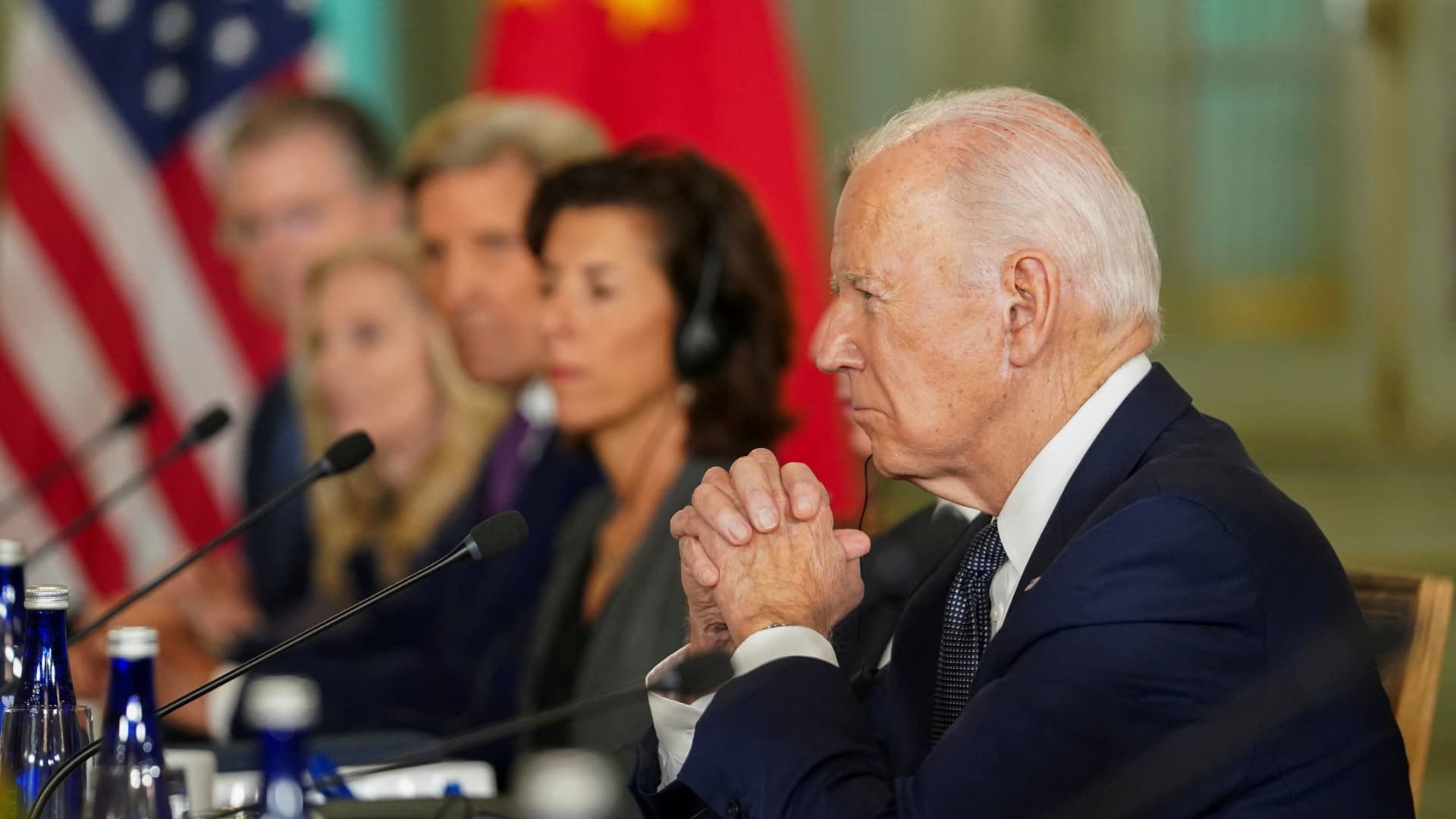U.S. President Joe Biden attends a bilateral meeting with Chinese President Xi Jinping at the Filoli Estate on the sidelines of the Asia-Pacific Economic Cooperation (APEC) summit in Woodside, California, United States, November 15, 2023. REUTERS/Kevin Lamarque
Kevin Lamarque | Reuters
The Biden administration this week sent several signals of a toughened U.S. economic strategy toward China.
On Wednesday, President Joe Biden met with Japanese Prime Minister Fumio Kishida in Washington, DC, to announce increased military cooperation between the two allies and demonstrate the strength of the US-Japan economic relationship.
“We agreed that our two countries will continue to respond to China’s challenges through close coordination,” Kishida said at a joint news conference with Biden after their bilateral talks.
Earlier this week, Treasury Secretary Janet Yellen announced tougher economic red lines during a visit to China.
Yellen expressed concern shared by the United States and the European Union that Chinese companies are producing excess capacity of cheap, clean energy products such as solar panels and electric vehicles. If there are not enough buyers for the supply, Beijing could dump them on global markets.
The U.S. wouldn’t have ruled out future tariff increases on Chinese imports if Beijing doesn’t address overcapacity concerns, Yellen said in an interview with CNBC’s Sara Eisen after meetings with her Chinese counterpart, Vice Premier He Lifeng.
China has so far dismissed accusations of overcapacity as “baseless” and rejected the US’s threat of protectionist trade policies to stifle global competition.
The prospect of new economic tensions between the U.S. and China comes as the two countries seek to stabilize their already strained ties after several years of minimal communication, sparked in part by a years-long tariff war.
“It remains unclear how this relationship will endure in the coming months and years,” Yellen said at a news conference in Beijing on Monday.
Taken together, the administration’s moves provide useful talking points for Biden in the 2024 campaign, in which both he and Republican Donald Trump express anti-China worldviews.
But they also run the risk of freezing bilateral relations between the two superpowers again.
“Just for show”
Economists largely see Biden’s threat of higher tariffs against China as more of a political tool than an economic one.
“That won’t solve the problem. It’s just for show,” said Christopher Tang, a professor of global supply chains at the University of California, Los Angeles. “In my view, this is a job for voters to gain support for Biden.”
The president has escalated his economic aggression against China while Trump is doing the same, both vying for the votes of American workers.
Trump has said he would consider a 60% tariff on all Chinese imports and possibly a 10% tariff on all imports across the board.
Former President Donald Trump speaks to guests at a rally on April 2, 2024 in Green Bay, Wisconsin.
Scott Olson | Getty Images
Biden has imposed his own tariffs on Chinese electric vehicles and other clean energy products. He has doubled down on those threats, promising to protect the green jobs in the US that his 2022 Inflation Reduction Act helped create.
“Tariffs cannot solve the underlying problem, which is that the Chinese system has structural problems that are not being solved,” said Daniel Rosen, co-founder of research firm Rhodium Group.
Rather, Rosen sees tariff increases as a “bridging measure” to temporarily contain surges in excess capacity when they occur. The increases also had a political benefit by showing voters that “the current rulers are not asleep at the wheel” when it comes to global economic threats, he said.
Gaps and consequences
Tariffs can have unintended economic consequences that ultimately penalize American importers and consumers more than intended Chinese exporters.
For example, according to a report from the US International Trade Commission, US importers bore almost the entire cost of China tariffs imposed during the Trump administration and largely maintained under Biden.
“U.S. importers have absorbed the costs of tariffs through a combination of less favorable margins for sellers and higher prices for consumers or downstream buyers,” the report said.
One reason for this are loopholes that Chinese exporters can use to avoid tariffs.
“You can impose more tariffs, but there are workaround systems,” said Tang, a professor at UCLA.
For example, the Office of the U.S. Trade Representative lists tariff exemptions for certain products if parties demonstrate that the tariff caused economic harm or if the product could not be imported from elsewhere.
Chinese exporters can also avoid the tariffs by shipping their products to another country for the final manufacturing steps before they reach their final destination in the United States. For example, China could ship battery components to Mexico, where the battery is fully assembled and then exported to the United States without incurring the duty.
Overall, tariff increases could have a negative short-term impact on the US economy.
Goldman Sachs estimates that each one percentage point increase in the effective tariff rate would directly reduce gross domestic product by 0.03%, increase consumer prices by 0.1% and increase inflation for one year.
“We’ve seen the consequences since Trump’s tariffs … many manufacturers have passed the cost increase on to consumers,” Tang said. “Then the question becomes: What exactly are we trying to achieve?”
Don’t miss these exclusives from CNBC PRO
Source link
2024-04-11 22:17:13
www.cnbc.com















